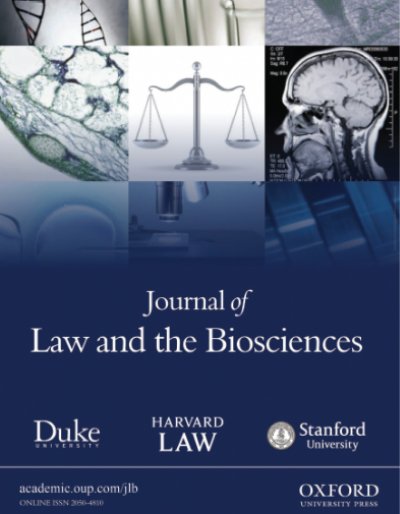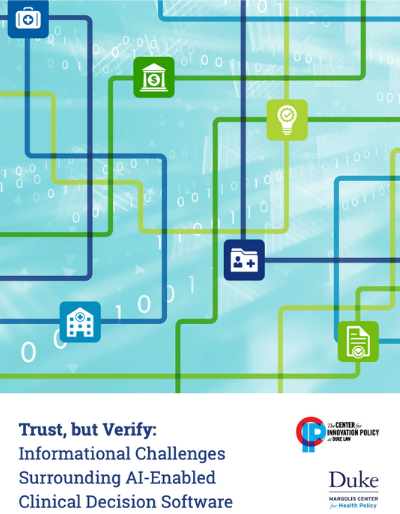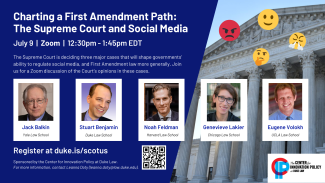The Center for Innovation Policy
The Center for Innovation Policy at Duke Law is a forum for independent analysis and balanced discussion of policies for promoting technological innovation that enhances long-term social welfare.
Latest News
Recent Events
November 05, 2025
- • Sanford 223, Rhodes Conference Room
Join the Deep Tech initiative in partnership with the Duke Quantum Center and The Center for Innovation Policy and Law for an interdisciplinary forum introducing quantum science and technology at Duke. The event will bring together faculty, students, and experts to explore quantum computing, technical innovations, and policy implications shaping the field. Highlights include panels on applications across disciplines, governance and security considerations, and a student poster session showcasing emerging research. Whether you're curious about the basics or eager to connect with collaborators, this forum is a gateway to Duke's growing role in advancing quantum research and regional innovation.
October 17, 2025
- • Virtual
The Trump Administration's threats to revoke broadcasters' licenses and President Trump's lawsuits against media companies implicate important, and contested, Supreme Court doctrines. Should these actions affect how courts and scholars analyze these First Amendment doctrines? This online event brings together leading First Amendment scholars Jack Balkin (Yale), Stuart Benjamin (Duke), Noah Feldman (Harvard), Genevieve Lakier (Chicago), and Tim Wu (Columbia) to examine whether the Trump Administration's actions affect how courts and scholars should analyze the First Amendment's application to the media. Register here: https://duke.is/1stam Sponsored by the Center for Innovation Policy. For more information, please contact Leanna Doty at leanna.doty@law.duke.edu.
July 09, 2024
- • Virtual
The Supreme Court has just decided three major cases that will profoundly shape First Amendment limits on governments' ability to regulate social media, and First Amendment law more generally - NetChoice v. Paxton and Moody v. NetChoice (involving Texas and Florida laws restricting social media companies' content moderation) and Murthy v. Missouri (addressing who may challenge government communications that allegedly compel content moderation). On July 9, the Center for Innovation Policy at Duke Law will host an online symposium with leading First Amendment experts to discuss the significance and implications of the Court's opinions in these cases.
November 03, 2023
- • See description
Please join us for a unique event at Duke on the CHIPS and Science Act of 2022, a historic law that directs $52 billion in government spending to spur computer chip manufacturing and R&D in the United States. The event will feature experts from across the country and from all over Duke, including the Deans of Fuqua, Sanford, and Pratt along with Professor Ronnie Chatterji, who led implementation of the CHIPS Act in the Biden Administration before returning to Duke this fall. Space is limited and registration is required. Register for the conference here: https://duke.qualtrics.com/jfe/form/SV_5ASZsBdEGyQzpDo Sponsored by the Center for Innovation Policy at Duke Law and Duke Fuqua School of Business. For more information, please contact Leanna Doty at leanna.doty@law.duke.edu.
December 02, 2022
- • Virtual
As U.S. universities continue to internationalize their campuses, they benefit greatly from increased connectivity with their counterpart institutions abroad. Cross border research collaborations have increased as have student and scholar exchanges. At the same time, as American universities become more globally engaged, they have encountered a broad array of new challenges at home stemming from growing national security concerns as well as concerns about protecting the integrity of the U.S. R&D system. Our panelists, Lora Weiss, Penn State Univ., and Kelvin Droegemeier, Univ. of Oklahoma, have found themselves knee-deep in dealing with the various compliance issues and new regulations that have emerged as well as the impact of these issues on the innovation process itself. Our moderator, Denis Simon, the Center for Innovation Policy at Duke Law, will guide a discussion regarding how the performance of university research is being affected in both positive and negative ways. Sponsored by the Center for Innovation Policy at Duke Law; the Sanford Cyber Policy Program; the Duke Office of Research & Innovation; and, DQ, the Certificate in Digital Intelligence at Duke Science & Society. Registration required: https://bit.ly/3FJLnMI. For more information, please contact Balfour Smith (bsmith@law.duke.edu).
 November 2020
November 2020
Accountability, Secrecy, and Innovation in AI-Enabled Clinical Decision Software
Arti K. Rai, Isha Sharma, & Christina Silcox
Journal of Law and the Biosciences
14 November 2020
This article employs analytical and empirical tools to dissect the complex relationship between secrecy, accountability, and innovation incentives in clinical decision software enabled by machine learning (ML-CD). The authors provide specific suggestions for how FDA regulation, patent law, and tort liability could be tweaked to improve information flow without sacrificing innovation incentives.
 September 2020
September 2020
Trust, but Verify: Informational Challenges Surrounding AI-Enabled Clinical Decision Software
Christina Silcox, Arti K. Rai, & Isha Sharma
18 September 2020
The Center for Innovation Policy at Duke Law and the Duke-Margolis Center for Health Policy white paper, funded by the Greenwall Foundation, discusses ways to incentivize innovation in AI-enabled medical products while effectively communicating how and when to use them.
 March 2018
March 2018
Righting the Research Imbalance
Stephen A. Merrill
March 2018
Research in the physical sciences and engineering yields results important to technological innovation, national security, and economic growth. But since the end of the Cold War, public funding of work in these fields has lagged in relation to the size of the economy, expenditures by governments of other countries, and our own government’s support of the biological and medical sciences. This white paper documents the extent of the deficit, explains how it came about and why attempts to correct it have failed, shows that non-federal government sources of funding have not stepped up to compensate, and discusses needed next steps.



